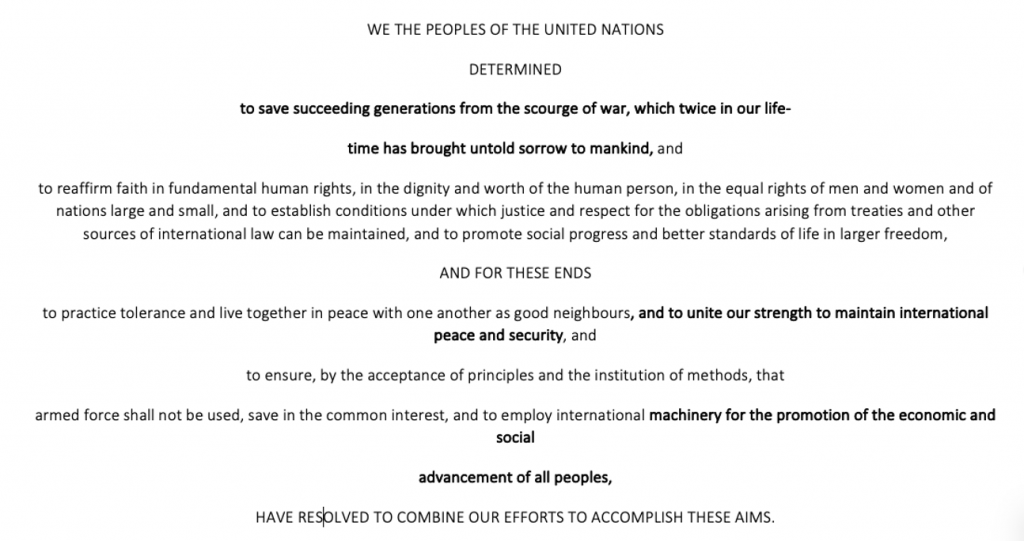After WW2, the world and its leaders had to contend with the reality of what the war had left them with. The war was over but in the post-war world it probably felt as though peace was fragile. The conflict was still so raw, and people were still bitter. These sentiments could not grow into what they had amounted to last time. This time round had to be different.
The solution to maintaining peace in a post war world was the United Nations. The Big Three, comprising of the UK, the USSR and the USA, decided before the war ended to establish the United Nations.
The first United Nations conference from the 25th of April to 26th of June 1945 saw representatives of 50 countries gathered in the name of world peace. Four months later, the United Nations could officially begin to practise diplomacy, as the United Nations Charter was ratified by its five permanent members. These five permanent members were China, France, the USA, the UK and the USSR – making up the United Nations Security Council (UNSC). Otherwise known as the victors of WW2. What set these permanent members apart was not just their status as winners of the war but the fact they held veto powers. The word ‘veto’ in Latin means ‘I forbid’ and so vetoing a resolution meant that it could not be passed, because one of those countries said so. They could do this regardless of reason and international support.
The United Nations Charter established the mission of the UN and by signing it, the 50 countries were bound to the charter and all it stood for.

Considering the UN’s mission, how does the veto power fit in? Many will say it contradicts all the UN stands for; some will say it is necessary to keep the UN functioning healthily. I will consider both arguments in turn.
Some view the veto power as necessary to maintain peace. All the permanent members are nuclear powers, all have reasonably large military power and so in summary, upsetting any of the permanent members comes at a risk of causing ‘the scourge of war’ to happen again. Furthermore, there are some who assert that the right to veto a resolution is what prevents war breaking out among the permanent security council members. Additionally, the veto allows these superpower countries to prevent biased or one-sided resolutions being passed. Surely it makes sense that the powers who won the war would be the best at maintaining peace afterwards. Right?
But one could ask, is this effective peacekeeping? My fellow history GCSE students will recall what appeasement did to international relations last time. Tiptoeing around superpowers like Russia has given them the perfect safeguard when the international community should start to point fingers at them. Appeasement is what allowed Hitler to eventually invade Poland, having been allowed by Britain and France to reclaim territory and restore military power. These western powers supposedly appeased Germany in the name of world peace. And yet, if the UN’s mission is not to repeat the mistakes of the past, doesn’t the right to a veto come a little too close to 1938?
Additionally, the veto is undemocratic, at least to many UN cynics. There are in total 15 states which make up the UNSC: 5 aforementioned permanent members and 10 non-permanent members, with 2-year terms. Yet, if 14 out the 15 members of the security council vote to pass a resolution (which needs passing or the UN cannot take meaningful action) but 1 permanent member vetoes it, it will not pass. They may have had good moral reasons to veto, but it is far more likely that the resolution conflicted with the country’s self-perceived national interest. Therefore, in this case, is the UN really functioning for the good of all peoples? Or for the good of one of the permanent member’s economic or political interests?
An example of where this dilemma played out is when China vetoed a resolution, which sought to tackle the ongoing genocide of Rohingya Muslims in Myanmar. China can be relied upon to veto such a resolution as they themselves are accused (and almost certainly rightly so) of committing genocide against the Chinese Uighur Muslims. In addition, China is a trade partner with Myanmar and so if they were to support a resolution which sought to investigate/sanction Myanmar it would be at the expense of their own financial affairs.
Was this reaffirming faith in fundamental human rights? This use or perhaps abuse of the veto power is not an isolated event either.
As the world casts their eyes to Ukraine, horrified by the brutality of the Russian invasion, this was the moment in which the UN had to step up to keep peace. This was their chance to prevent history from repeating itself. However, when a draft resolution condemning the invasion was presented, of course it could not go further, having been vetoed by none other than the aggressor themselves. Here, Russia’s veto proved that the vote has and very well will continue to hinder the functioning of the UN, which surely should be on the side of the invaded or oppressed when it comes to humanitarian crises.
Wherever you would place yourself on a scale of “strongly agree” to “strongly disagree” with the power to veto, the controversy this issue has sparked has triggered further discussion. The concept of voluntary restraint has been proposed to correct the shortcomings caused by the right to veto. This new concept would mean that the permanent members would have a responsibility not to use their veto in situations where mass atrocities are taking place, like in Myanmar and Ukraine.
However practical its implementation might be, it is encouraging to see the UN realise the limitations of diplomacy caused by such a divisive vote. And whatever the future of the veto is, the UN will still provide the space for diplomatic discussion that it always has, whether or not it is consistently effective. If anything, this development should be a call to arms for budding delegates and diplomats; the future of international relations is in our generation’s hands, and there is still so much to do if we are to honour the original Charter and all its hopes of peace with it.
